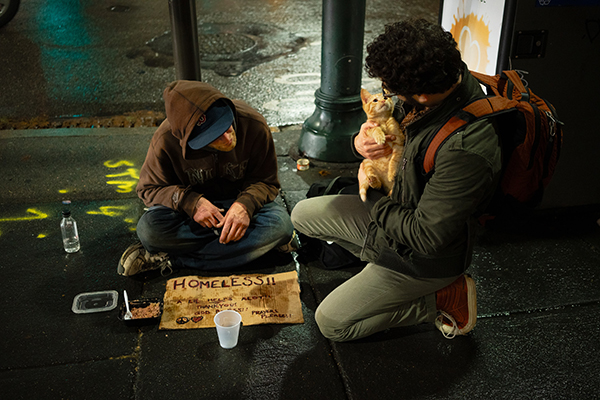
I have to admit, I have avoided the book of Job most of my life. I read it in its entirety once in my twenties, so that I could check off the box and say that I had actually read the whole Bible. Job is not a book that you hear about much in sermons, and I don’t remember helping kids memorize any verses from Job in Sunday School or at AWANA. It was easy enough to avoid.
Then a couple of years ago, a friend of mine, a cancer survivor, told me that she had just finished a great book about Job. I listened politely, smiled and nodded and then excused myself. A few weeks later, I received this book as a gift from her on my birthday. The book, Let God be God: Life-Changing Truths from the Book of Job, by Ray C. Stedman, sat on my shelf for a few weeks. But my friend kept asking about it, so I was obligated to dust it off and start digging deeper into what I considered a pretty depressing book of the Bible.
Poor Job suffered more pain and loss than anyone else I know. Job lost all of his belongings and all of his sons and daughters, and was afflicted with painful sores. His wife told him to “curse God and die” (Job 2:9). And this all took place after Satan essentially challenged God: “But now stretch out your hand and strike everything he has, and he will surely curse you to your face” (Job 1:11). Satan was allowed to attack Job. It is not pleasant to reflect on why God would allow Satan to cause so much tragedy, pain and loss. I have to ask God why he would pick on Job, when Job’s faithfulness could have proven another way, right?
Suffering reminds us of our unanswered questions, starting with: If God is good, why would he allow so much pain and suffering, especially in the lives of people who do not seem to deserve it? From our human perspective, we tend to forget that we all deserve death, and that it is only by God’s grace that we are saved and do not get what we deserve. God wants us to see more from his perspective. Staring in the thirty-eighth chapter of Job, God speaks. “Where were you when I laid the earth’s foundation? Tell me, if you understand” (Job 38:4). Job grieved and cried out to the Lord, but he did not curse God. He held onto his faith in God, even though he could not understand what God was doing. In the end, Job received blessings that far outweighed the heavy losses he had suffered.
Job’s story shows us that God brings purpose out of suffering. He often wants to teach us something about ourselves, or show us more of who he is. Other people come to know Christ when they see people walk through suffering with peace that is not like anything they have seen before. Job’s suffering served to prove Satan wrong, so there was a spiritual victory that came out of Job’s painful losses. Satan wants our suffering to result in the loss of our faith, but out of suffering, God can bring blessings that we could not have imagined. In the end, God restored Job, blessed him with more wealth and family than he lost.
Martin Luther said, “Until a person experiences suffering, he cannot know what it means to hope.” Working with women coming out of homelessness, trauma and addiction means seeing people suffer in many ways, and it provides incredible opportunities for hope. The silver lining of addiction is that we can see clearly that we do not have all the answers and we are powerless to help ourselves. Through the suffering of addiction and attempts at recovery, there is an opportunity for people to surrender more fully to God and his will for their lives. I certainly had this experience in my journey of addiction and recovery. After some painful consequences, it became clear to me that my way did not work, so I was ready to really follow Jesus and try things his way. The suffering that I experienced helped me realize that I needed Jesus not just as my Savior, but also as my LORD.
While all suffering can ultimately be traced back to Original Sin, not all suffering that people experience is directly the result of their own sin. Job’s “friends” came to comfort him in his suffering, but instead of comfort they brought judgment, through a long series of tedious lectures. They advised Job to repent of the sin he must be hiding. Job was not suffering as a result of unconfessed sin, so their harsh judgment left him even more isolated in his pain. In the last chapter of the Book of Job, God rebukes the friends: “I am angry with you and your two friends, because you have not spoken the truth about me, as my servant Job has” (Job 42:7).
Blaming someone for their suffering is an effective way for us to distance ourselves from the situation. If someone “deserves” their plight, we may not be obligated to lend a helping hand. We tend to think that all people living on the streets are “addicts” who made really bad choices. While sometimes this characterization is true, when we hear from people living on the streets, we realize that the situation is much more complex and their stories are unique.

If we feel compelled to help someone, we may still try to keep a safe distance by unintentionally objectifying the people we are helping. We tend to associate compassion with charity or service, but the Latin origin of the word compassion means “to suffer with.” I know I would much rather alleviate suffering than experience more suffering myself. But there is no quick fix to the problem of suffering, and we are forced to face our own limits as human beings if we are to be compassionate. To “suffer with” someone means we enter into authentic relationship with them, admitting that we do not have all the answers. Even if we have scripture passages memorized and ready to fire off, suffering people need only our presence at first. I have found it is best to avoid isolating someone in their pain through our “wise” words, like Job’s friends did to him, or treating people like they are our charity projects.
To be with someone in their suffering is a rare gift. I know many people who have suffered painful losses and who felt abandoned by their friends—even their church family. People stay away because they do not know what to say or how to help. The reality is, we do not want to be so close to suffering. Suffering reminds us of our own mortality and limits, it reminds us of difficult questions for which we have no answers, and it forces us to face pain and losses that we have failed to grieve. Yet if we avoid entering into suffering with another person, we miss out on an opportunity to really love them well. This ministry of presence is a picture of us laying down our lives for others, as Jesus laid down his life for us.
I do not plan to seek out suffering (I am sure I will continue to come across it without much effort), but I want to accept it when it comes, without throwing an internal tantrum and whining at God, “Why me?” I have a friend and mentor who has learned to trust Jesus so completely that she does not get shaken in the face of loss, pain or suffering. Instead, she approaches the situation with curiosity, asking God what it is he wants her to see. After walking with Jesus for decades, she has learned to skip over the why question. Once we know the who (Jesus), we can skip the why and get to the what: perseverance, character and hope.
Romans 8:18
I consider that our present sufferings are not worth comparing with the glory that will be revealed in us.
Stacy Cleveland has been serving women and families coming out of homelessness since 2000. Through her own recovery journey, she felt called to offer hope to people struggling with addiction, by sharing the love of Jesus Christ through rescue ministry. Stacy and her husband, Scott, have been a part of LifeWay Church since 2003. She has four amazing daughters: Rayna, Jillian, Kyla and Bailey, who is married to Cody. She also enjoys being a grandma to her two beautiful granddaughters, Elaina and Freya. Stacy currently serves as Senior Director of Women and Children’s Ministries at Seattle’s Union Gospel Mission.